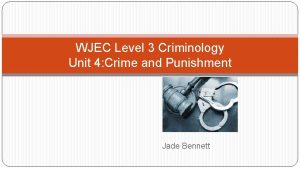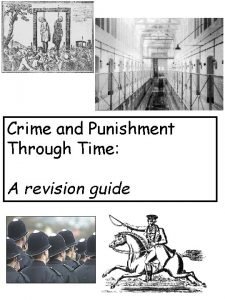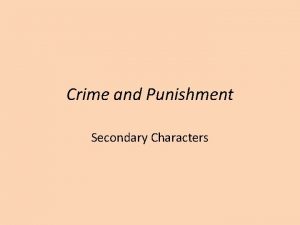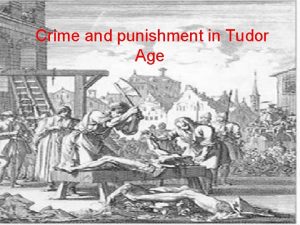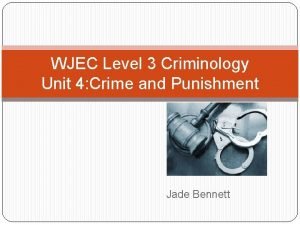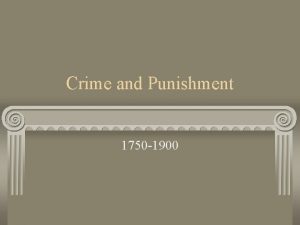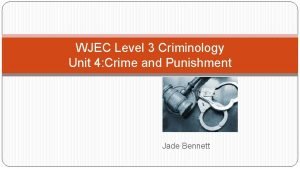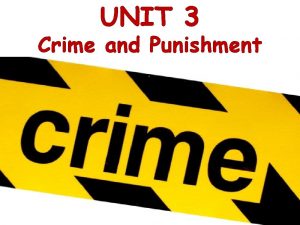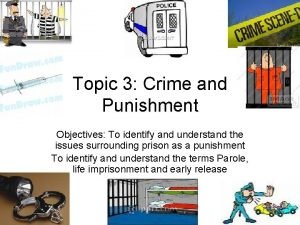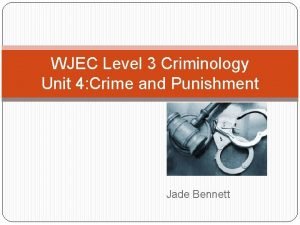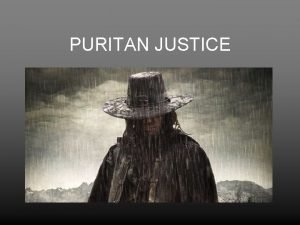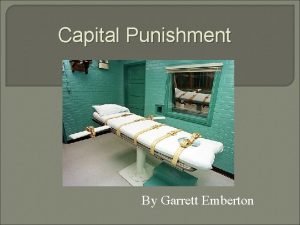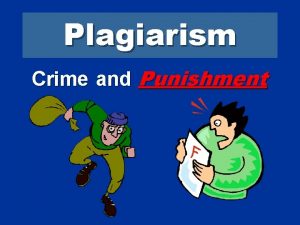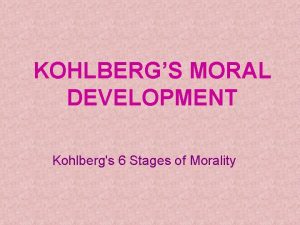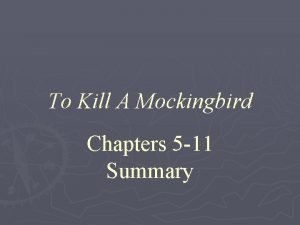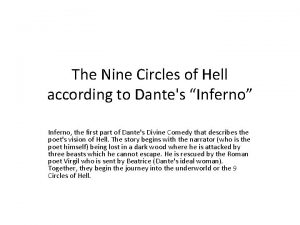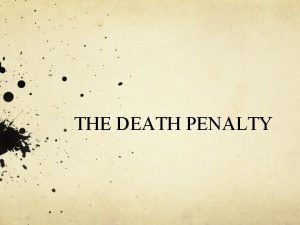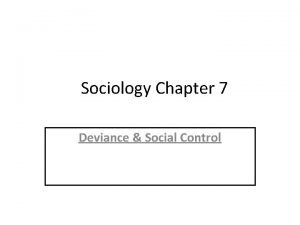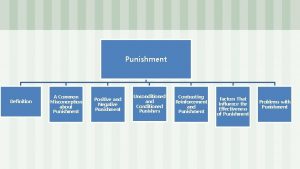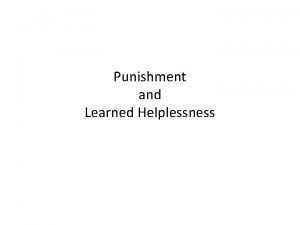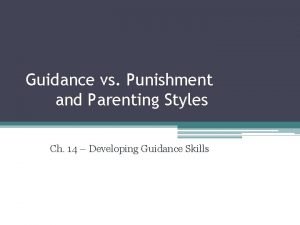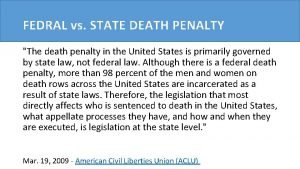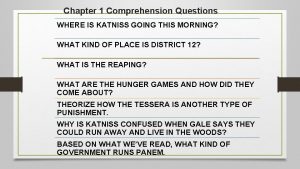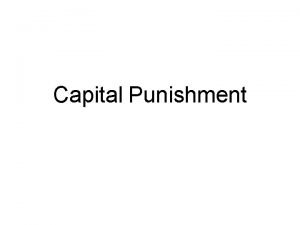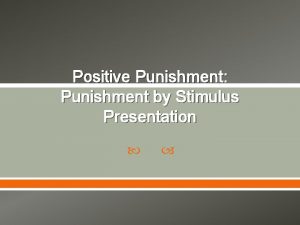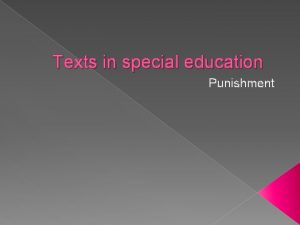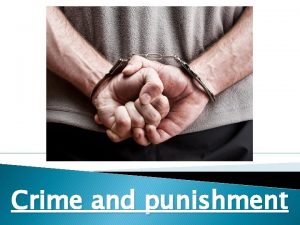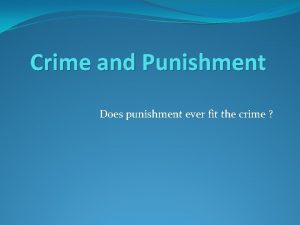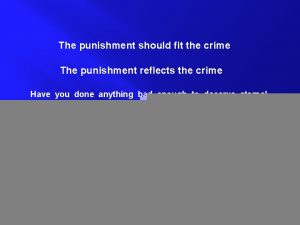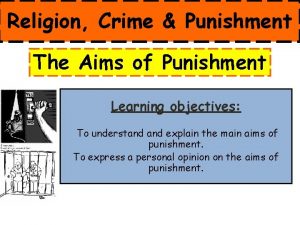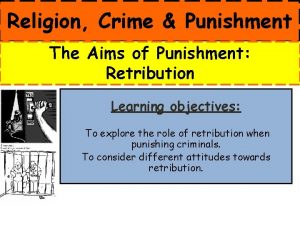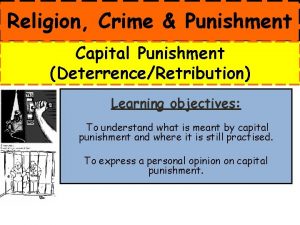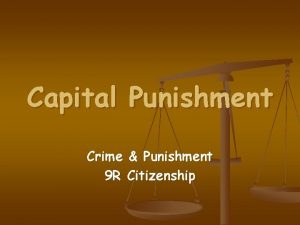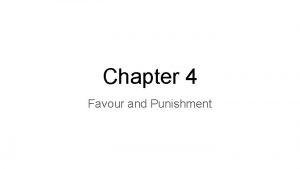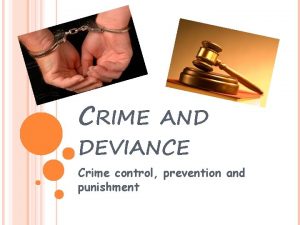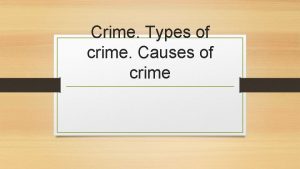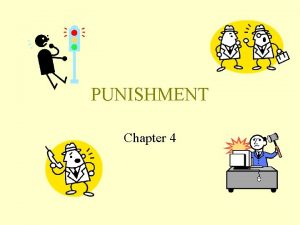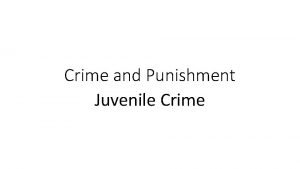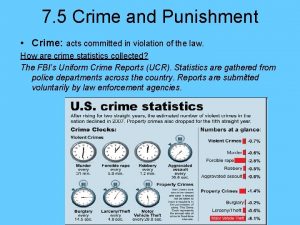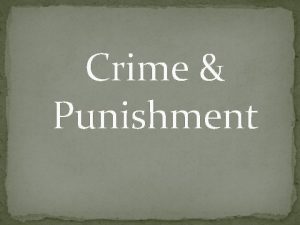CRIME AND PUNISHMENT CHAPTER 10 4 Crime and
































- Slides: 32

CRIME AND PUNISHMENT CHAPTER 10 -4

Crime and Punishment • The Constitution protects rights of people accused of crimes, including the right to a fair trial. • Rights of Convicted People: The Constitution prohibits government from imposing excessive fines or cruel and unusual punishments.

Crime and Punishment The Constitutional goal – accused persons receive fair and reasonable treatment From arrest to trial to punishment.

The U. S. Justice System -Basic freedoms are guarded by the justice system. -Provides protections for accused and convicted -Seeks fair and impartial outcomes -Follows rules and guidelines (due process)to resolve civil & criminal trials, and other disputes.

The U. S. Justice System • Two categories of law • Civil law covers private disputes between people over property, relationships • Penalties – fines, injunctions, declaratory judgment • Criminal law is system for dealing with crimes, punishments • Punishments - fined, imprisoned, executed

The U. S. Justice System Categories of Civil Law Contract Law: Legal agreement between two or more parties; verbal or written, but all legally binding Tort law: Actions harmful to another person; medical malpractice, civil rights violation, libel, slander Property law: Purchase, sale of property; house, auto Family law: marriage, divorce, child custody, wills

The U. S. Justice System Civil law case called lawsuit -plaintiff brings suit against defendant Seeking damages – Compensation for injury Alternative to trial -mediation, arbitration, negotiation - no resolution lawsuit moves forward

The U. S. Justice System Steps of civil trial: 1. Plaintiff hires lawyer 2. Files complaint 3. Seek to settle before trial 4. trial goes forward if no settlement 5. Trial heard by jury or judge 6. Jury, judge issues ruling 7. Decisions may be appealed

The U. S. Justice System Civil Law Decisions based on preponderance of the evidence. -Not based on reasonable doubt -Winner's side of the story is more probably true than not true. -Does not mean that one side brought in more evidence than the other side. -It means that one side's evidence was more convincing than the other's.

The U. S. Justice System • Criminal Law — Offenses against public (The State) — Local, state, federal law — Misdemeanor minor offense; traffic, petty theft — Felony serious; murder, sexual assault, grand theft

The U. S. Justice System • Criminal Case Processes — 5 th Amendment guarantee: Federal or felony charges generally require Grand Jury — Grand jury decides if enough evidence to charge person with crime — Issues formal complaint, indictment — Accused arrested -Miranda Rights read -Attorney provided if needed -Plea entered (arraignment)

The U. S. Justice System Bail—money pledged by accused as guarantee he/she will return for 1. trial—may be set 2. Plea bargain may be reached 3. If trial proceeds, complex process begins —

The U. S. Justice System • Jury Trial — Jury selection comes first — Prosecution and defense each offer evidence, witnesses — Judge or jury decides case — Either side may appeal decision to higher court — If defendant found guilty, sentencing takes place at separate hearing —

The U. S. Justice System Sentences depend on severity of crime: 1. probation 2. prison time, 3. capital punishment—punishment by death—most severe sentence

The U. S. Justice System Presumption of innocence - innocent until proven guilty Standard of guilt - beyond a reasonable doubt. Goal - Balance rights of the accused with the need to a protect society

Rights of Accused Habeas Corpus • Fifth Amendment includes guarantee people cannot be tried for most federal crimes without first being indicted by grand jury • Some states do not have grand jury system • Criminal charges brought by District Attorney


Rights of Accused Self-Incrimination • Fifth Amendment protects accused from witnessing against him/herself • Protection covers any government proceeding that might lead to criminal charges; covers only spoken testimony • Government can get people to testify against selves by granting immunity • 1966, Miranda v. Arizona: questioning suspects without giving right to consult with attorney violates Fifth Amendment

Rights of Accused • Miranda requires police to read Miranda warnings to suspects • Right to remain silent • Anything they say may be used against them in court • Right to have attorney; court-appointed attorney provided if they cannot afford attorney

Rights of Accused • Failure to Mirandandize may result in courts refusing to consider confession as evidence • Critics: some guilty people go unpunished because police did not inform of rights • Supporters: warnings protect innocent people from being tricked, forced into confessing to crimes they did not commit

Rights of Accused Bail • Eighth Amendment: “excessive bail shall not be required” • Not all must be allowed to post bail • Some charged with crimes like murder not allowed to post bail

Rights of Accused Bills of Attainder • Bill of attainder declares person guilty; takes away right to trial • Constitutionally prohibited from being passed by states or Congress as violation of separation of powers

The U. S. Justice System Ex Post Facto Laws • Apply to legal events in past; outlawed by Constitution • Such laws would make it possible to punish person for actions legal at time committed

The U. S. Justice System Speedy and Public Trial • Sixth Amendment: “accused shall enjoy the right to a speedy and public trial” • Innocent person may spend less time in jail, witnesses’ memories fresher, testimony more accurate • Public trial prevents abuses of law, allows public to monitor proceedings

The U. S. Justice System Speedy and Public Trial… • Press may have access to courtroom controversial; may influence jurors • Supreme Court: televising trial does not prevent fair trial • Courts have power to limit public access to courtrooms • May close trial to public to ensure fair trial, protect the public interest

The U. S. Justice System Trial by Jury • 6 th Amendment: right to trial by jury, incorporated into 14 th Amendment (States) • Trial jury made up of 12 jurors • Takes place in district in which crime took place • Bench trial: one in which judge alone hears trial

The U. S. Justice System Right to an Adequate Defense • Defendants must be informed of charges against them • Be confronted with and have chance to cross-examine, witnesses • Adequate legal representation guaranteed • Right to attorney • Lawyer’s failure to meet professional standards violation of defendant’s rights

The U. S. Justice System Double Jeopardy • Double jeopardy: no one can be made to stand trial twice for same offense • Incorporated into 14 th Amendment • Not double jeopardy if jury fails to reach verdict • Government may try case again


The U. S. Justice System Punishment • Excessive Fines 1. Eighth Amendment: prohibits government from imposing excessive fines 2. Limit applies only to government fines 3. Civil juries have few limits

The U. S. Justice System • Cruel and Unusual Punishments — Banned by Eighth Amendment — Supreme Court has never defined “cruel and unusual” — Debate has figured into numerous cases involving death penalty

The U. S. Justice System Capital Punishment Death penalty practiced at time Bill of Rights written Supreme Court has consistently ruled capital punishment constitutional Number of crimes for which capital punishment applied reduced Most states allow death penalty New technology (DNA) has helped prove innocence of some convicted criminal
 Criminology unit 4 notes
Criminology unit 4 notes Crime and punishment revision guide
Crime and punishment revision guide Characters in crime and punishment
Characters in crime and punishment Crime and punishment in tudor times
Crime and punishment in tudor times Wjec criminology unit 4
Wjec criminology unit 4 Medieval crime and punishment facts
Medieval crime and punishment facts Edexcel gcse history crime and punishment exam questions
Edexcel gcse history crime and punishment exam questions Kahoot crime and punishment
Kahoot crime and punishment Crime and punishment in medieval japan
Crime and punishment in medieval japan Crime and punishment 1750 to 1900
Crime and punishment 1750 to 1900 Unit 4 criminology
Unit 4 criminology Crime and punishment key words
Crime and punishment key words Crime and punishment topic
Crime and punishment topic Criminology unit 4 revision
Criminology unit 4 revision Tsw crime and punishment
Tsw crime and punishment Puritan punishments
Puritan punishments Thesis statement about the death penalty
Thesis statement about the death penalty Plagiarism crime punishment
Plagiarism crime punishment Good boy/nice girl orientation
Good boy/nice girl orientation Wheel of misfortune ideas
Wheel of misfortune ideas Chapter 10-11 to kill a mockingbird summary
Chapter 10-11 to kill a mockingbird summary First circle of hell
First circle of hell Capital punishment definition
Capital punishment definition Labeling theory real life examples
Labeling theory real life examples Why did tybalt die
Why did tybalt die Positive punishment adalah
Positive punishment adalah Learned helplessness
Learned helplessness Target person
Target person Rigid parenting
Rigid parenting Capital punishment definition
Capital punishment definition Theorize how the tessera is another type of punishment
Theorize how the tessera is another type of punishment Capital punishment definition
Capital punishment definition Dante inferno canto 7
Dante inferno canto 7
